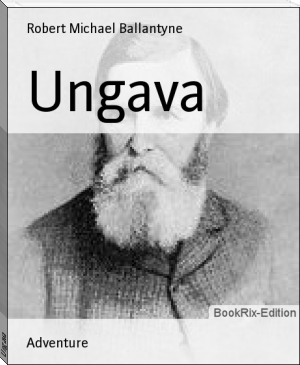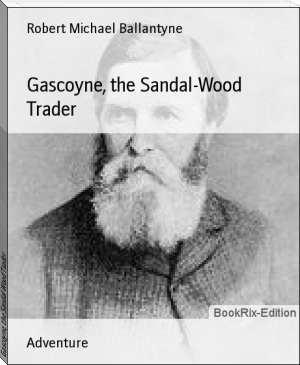Ungava - Robert Michael Ballantyne (distant reading txt) 📗

- Author: Robert Michael Ballantyne
Book online «Ungava - Robert Michael Ballantyne (distant reading txt) 📗». Author Robert Michael Ballantyne
"It's my 'pinion, sir," remarked the guide, as he followed Frank up the ravine, the sheltered parts of which were covered with a few clumps of stunted pines--"it's my 'pinion that we'll have to cut our logs a long bit up the river, for there's nothin' fit to raise a fort with hereabouts."
"True, Massan," replied Frank, glancing from side to side, hunter fashion, as he walked swiftly over the broken ground; "there's not a tree that I can see big enough to build a backwoods shanty with."
"Well, master, 'twill do for firewood, if it's fit for nothin' else, and that's a blessin' that's not always to be comed by everywhere. Let's be thankful for small matters. I see sticks growin' up them gullies that'll do for stakes for the nets, an' axe handles, an' paddles, an' spear shafts, an'--"
The honest guide's enumeration of the various articles into which the small timber of the place might be converted was brought to a sudden pause by Frank, who laid his hand on his shoulder, and while he pointed with the butt of his rifle up the ravine, whispered, "Don't you see anything else up yonder besides trees, Massan?"
The guide looked in the direction indicated, and by an expressive grunt showed that his eye had fallen on the object referred to by his companion. It was a deer which stood on an overhanging ledge of rock, high up the cliffs--so high that it might easily have been mistaken for a much smaller animal by less practised sportsmen. Below the shelf on which it stood was a yawning abyss, which rendered any attempt to get near the animal utterly hopeless.
"What a pity," said Frank, as he crouched behind a projecting rock, "that it's out of shot! It would take us an hour at least to get behind it, and there's little chance, I fear, of its waiting for us."
"No chance whatever," replied Massan decidedly. "But he's big enough to cover from where we stand."
"To cover! Ay, truly, I could point straight at his heart easy enough-- indeed I would think it but slight boasting to say I could cover his eye from this spot--but the bullet would refuse to go, Massan; it's far beyond shot."
"Try, sir, try," exclaimed the guide quickly, for as they spoke the deer moved. "I've been huntin' on the Rocky Mountains afore now, an' I know that distance cheats you in sich places. It's not so far as you think--"
He had scarcely finished speaking when Frank's rifle poured forth its contents. The loud echoes of the crags reverberated as the smoke floated away to leeward. The next instant the deer sprang with one wild bound high into the air--over the cliff--and descending with lightning speed through the dark space, was dashed almost in pieces on the rocks below.
Massan gave a low chuckle of satisfaction as he walked up to the mangled animal, and pointing to a small round hole just over its heart, he said, "The old spot, Mr Frank; ye always hit them there."
Having paid Frank this compliment, Massan bled the animal, which was in prime condition, with at least two inches of fat on its flanks, and having placed it on his shoulders, returned with his companion to the canoe.
While Frank was thus engaged, Stanley had descended towards the shores of Ungava Bay, which he found to be about twenty-five miles distant from the encampment beside the spring. He made a rapid survey of the coast as they descended, and sounded the river at intervals. When he reached its mouth he had made two important discoveries. The one was, that there did not seem to be a spot along the whole line of coast so well fitted in all respects for an establishment as the place whereon their tents were already pitched. The other was, that the river, from its mouth up to that point, was deep enough to float a vessel of at least three or four hundred tons burden. This was very satisfactory, and he was about to return to the camp when he came upon the deserted Esquimau village which, a few weeks before, had been the scene of a murderous attack and a hasty flight. On a careful examination of the place, the marks of a hasty departure were so apparent that Stanley and his men made a pretty near guess at the true state of affairs; and the former rightly conjectured that, having made a precipitate flight in consequence of some unexpected attack, there was little probability of their returning soon to the same locality. This was unfortunate, but in the hope that he might be mistaken in these conjectures, and that the natives might yet return before winter, he set up a pole on a conspicuous place, and tied to the top of it a bag containing two dozen knives, one dozen fire-steels, some awls and needles, several pounds of beads, and a variety of such trinkets as were most likely to prove acceptable to a savage people.
While Bryan was engaged in piling a heap of stones at the foot of this pole to prevent its being blown down by the wind, the rest of the party re-embarked, and prepared to return home; for although the camp beside the spring was scarcely one day old, the fact that it was likely to become the future residence of the little party had already invested it with a species of homelike attraction. Man is a strange animal, and whatever untravelled philosophers may say to the contrary, he speedily makes himself "at home" _anywhere_!
"Hallo, Bryan!" shouted Stanley from the canoe, "look sharp; we're waiting for you!"
"Ay, ay, yer honour," replied the Irishman, lifting a huge mass of rock; "jist wan more, an' it'll be stiff an' stidy as the north pole himself." Then in an undertone he added, "`Look sharp,' is it ye say? It's blunt ye are to spake that way to yer betters. Musha! but it's mysilf wouldn't give a tinpinny for all that bag houlds, twinty times doubled; an' yit thim haythens, thim pork-faced Huskimos, 'll dance round this here pole wi' delight till they're fit to dhrop. Och! but salvages is a quare lot; an', Bryan, yer a cliver boy to come this far all the way to see thim."
With this self-complimentary conclusion, Bryan resumed his place at the paddle, and the party returned to the camp.
Here they found things in a most satisfactory state. Frank and his party had returned, and the deer, now cut up into joints and steaks, was impaled on a number of stakes of wood, and stuck up to roast round a large and cheering fire. The savoury steam from these, with the refreshing odour of the tea-kettle, produced a delectable sensation in the nostrils of the hungry explorers. Stanley's tent was erected with its back towards the mountains and its open door towards the fire, which lighted up its snug interior, and revealed Mrs Stanley and Edith immersed in culinary operations, and Chimo watching them with a look of deep, grave sagacity--his ears very erect, and his head a good deal inclined to one side, as if that position favoured the peculiar train of his cogitations. La Roche was performing feats of agility round the fire, that led one to believe he must be at least half a salamander. At a respectful distance from Stanley's tent, but within the influence of the fire, the men were employed in pitching, for the first time, the large skin tent which was to be their residence until they should build a house for themselves; and on a log, within dangerous proximity to the mercurial La Roche, sat Frank Morton, busily employed in entering in his journal the various events of the day.
There was much talk and loud laughter round the fire that night, for the different parties had much to tell and much to hear regarding the discoveries that had been made, and discussions as to the prospects of the expedition were earnest and long. It was generally admitted that first appearances were, upon the whole, favourable, although it could not be denied that the place looked dreadfully barren and rugged. Under the happy influence of this impression, and the happier influence of the savoury steaks on which they had supped, the entire party lay down to rest, and slept so profoundly that there was neither sound nor motion to indicate the presence of human beings in the vast solitudes of Ungava, save the fitful flame of the fire as it rose and fell, casting a lurid light on the base of the rugged mountains, and a sharp reflection on the dark waters.
CHAPTER SIXTEEN.
RESOURCES OF THE COUNTRY BEGIN TO DEVELOP--BRYAN DISTINGUISHES HIMSELF-- FISHING EXTRAORDINARY.
There is a calm but deep-seated and powerful pleasure which fills the heart, and seems to permeate the entire being, when one awakens to the conviction that a day of arduous toil is about to begin--toil of an uncertain kind, perhaps connected with danger and adventure, in an unexplored region of the earth. Ignorance always paints coming events in glowing colours; and the mere fact that our adventurers knew not the nature of the country in which their tent was pitched--knew not whether the natives would receive them as friends or repel them as foes--knew not whether the nature and capabilities of the country were such as would be likely to convert the spot on which they lay into a comfortable home or a premature grave;--the mere fact of being utterly ignorant on these points was, in itself, sufficient to fill the poorest spirit of the band (had there been a poor spirit among them) with a glow of pleasurable excitement, and a firm resolve to tax their powers of doing and suffering to the uttermost.
When the sun rose on the following morning the whole party was astir, the fire lighted, and an early breakfast in course of preparation. Much had to be done, and it behoved them to set about it with energy and at once, for the short autumn of these arctic





Comments (0)